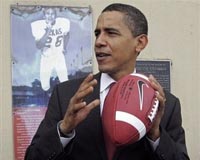 |
Brussels (UPI) May 23, 2011 The European Union Monday followed the U.S. example and for the first time imposed sanctions on Syrian President Bashar Assad in a bid to stop the violence against protesters. EU foreign ministers meeting in Brussels also agreed to sanction nine of Assad's closest aides with travel bans and asset freezes, the BBC reports. Targeting Assad "is the right thing to do," British Foreign Secretary William Hague was quoted as saying by news Web site EUobserver. "The repression in Syria continues and it is important to see the right of peaceful protest, the release of prisoners and taking the path of reform, not repression." Brussels two weeks ago agreed to sanctions against 13 senior figures linked to the violence in Syria, a list that didn't include Assad. The Syrian leader had been seen as a potential reformer in the Middle East but is becoming increasingly isolated. Human rights groups say more than 850 people have been killed and thousands arrested in the crackdown on dissidents, who have been taking the streets in several Syrian cities since March. The regime has dispatched the military to dissident hot spots, with reports that security forces shot dozens of unarmed civilians. The Syrian government accuses armed criminals of sparking riots, saying they had killed more than 100 security personnel. In comments to the al-Watan newspaper, Assad admitted that the security services had made mistakes in handling the demonstrations because they were inexperienced. After the United States last week imposed sanctions on the Syrian president, European leaders, including Hague and German Foreign Minister Guido Westerwelle, came forward speaking in favor of following the U.S. example. The U.S. sanctions meant that Assad became the third leader after Libya's Moammar Gadhafi and Alexander Lukashenko of Belarus to be directly targeted by the United States. "President Assad now has a choice," U.S. President Barack Obama said last week in a widely awaited speech on the uprisings in North Africa and the Middle East. "He can lead that transition or get out of the way. The Syrian government must stop shooting demonstrators and allow peaceful protests." Meanwhile in Libya, another country gripped by a pro-democracy revolution, the European Union's foreign policy chief, Catherine Ashton, Sunday opened an EU mission in Benghazi, a rebel stronghold. "Gadhafi should leave and should allow the people to have the government in the future that they wish," she said after opening the three-person mission and talks with leaders from the Transitional National Council. Her spokesman Michael Mann told the EUobserver that the rebels asked Ashton for money. "It's important for them to pay their people, to stay solvent," Mann said.
Share This Article With Planet Earth
Related Links
 Obama stands by vision for Mideast peace
Obama stands by vision for Mideast peaceWashington (AFP) May 23, 2011 US President Barack Obama on Sunday stood his ground to defend his vision of an Israel-Palestinian peace deal following an unprecedented public lambasting from Israel's Benjamin Netanyahu. Obama took his message to some 10,000 of Israel's staunchest supporters, warning Washington's pro-Israel lobby that the results of a continued stalemate in the Middle East peace process could be dire for t ... read more |
|
| The content herein, unless otherwise known to be public domain, are Copyright 1995-2010 - SpaceDaily. AFP and UPI Wire Stories are copyright Agence France-Presse and United Press International. ESA Portal Reports are copyright European Space Agency. All NASA sourced material is public domain. Additional copyrights may apply in whole or part to other bona fide parties. Advertising does not imply endorsement,agreement or approval of any opinions, statements or information provided by SpaceDaily on any Web page published or hosted by SpaceDaily. Privacy Statement |